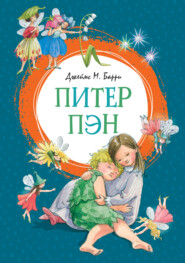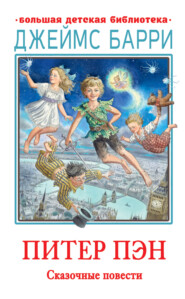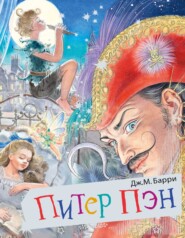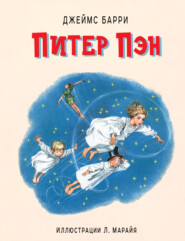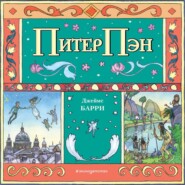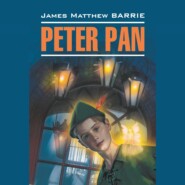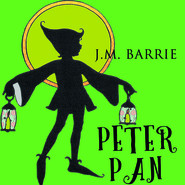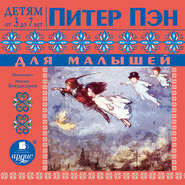По всем вопросам обращайтесь на: info@litportal.ru
(©) 2003-2025.
✖
The Little Minister
Настройки чтения
Размер шрифта
Высота строк
Поля
“It was a dog barking at somebody that’s stoning it. I ken that sound, Hendry Munn.”
“May I die the death, Tammas Whamond, if a great drap o’ rain didna strike me the now, and I swear it was warm. I’m for running hame.”
“I’m for seeing who drove awa that dog. Come back wi’ me, Hendry.”
“I winna. There’s no a soul on the hill but you and me and thae daffing and drinking gypsies. How do you no answer me, Tammas? Hie, Tammas Whamond, whaur are you? He’s gone! Ay, then I’ll mak’ tracks hame.”
In the broom – a dogcart:
“Do you see nothing yet, McKenzie?”
“Scarce the broom at my knees, Rintoul. There is not a light on the hill.”
“McKenzie, can that schoolmaster have deceived us?”
“It is probable.”
“Urge on the horse, however. There is a road through the broom, I know. Have we stuck again?”
“Rintoul, she is not here. I promised to help you to bring her back to the Spittal before this escapade became known, but we have failed to find her. If she is to be saved, it must be by herself. I daresay she has returned already. Let me turn the horse’s head. There is a storm brewing.”
“I will search this gypsy encampment first, if it is on the hill. Hark! that was a dog’s bark. Yes, it is Snap; but he would not bark at nothing. Why do you look behind you so often, McKenzie?”
“For some time, Rintoul, it has seemed to me that we are being followed. Listen!”
“I hear nothing. At last, McKenzie, at last, we are out of the broom.”
“And as I live, Rintoul, I see the gypsy lights!”
It might have been a lantern that was flashed across the hill. Then all that part of the world went suddenly on fire. Everything was horribly distinct in that white light. The firs of Caddam were so near that it seemed to have arrested them in a silent march upon the hill. The grass would not hide a pebble. The ground was scored with shadows of men and things. Twice the light flickered and recovered itself. A red serpent shot across it, and then again black night fell.
The hill had been illumined thus for nearly half a minute. During that time not even a dog stirred. The shadows of human beings lay on the ground as motionless as logs. What had been revealed seemed less a gypsy marriage than a picture. Or was it that during the ceremony every person on the hill had been turned into stone? The gypsy king, with his arm upraised, had not had time to let it fall. The men and women behind him had their mouths open, as if struck when on the point of calling out. Lord Rintoul had risen in the dogcart and was leaning forward. One of McKenzie’s feet was on the shaft. The man crouching 279 in the dogcart’s wake had flung up his hands to protect his face. The precentor, his neck outstretched, had a hand on each knee. All eyes were fixed, as in the death glare, on Gavin and Babbie, who stood before the king, their hands clasped over the tongs. Fear was petrified on the woman’s face, determination on the man’s.
They were all released by the crack of the thunder, but for another moment none could have swaggered.
“That was Lord Rintoul in the dogcart,” Babbie whispered, drawing in her breath.
“Yes, dear,” Gavin answered resolutely, “and now is the time for me to have my first and last talk with him. Remain here, Babbie. Do not move till I come back.”
“But, Gavin, he has seen. I fear him still.”
“He cannot touch you now, Babbie. You are my wife.”
In the vivid light Gavin had thought the dogcart much nearer than it was. He called Lord Rintoul’s name, but got no answer. There were shouts behind, gypsies running from the coming rain, dogs whining, but silence in front. The minister moved on some paces. Away to the left he heard voices —
“Who was the man, McKenzie?”
“My lord, I have lost sight of you. This is not the way to the camp.”
“Tell me, McKenzie, that you did not see what I saw.”
“Rintoul, I beseech you to turn back. We are too late.”
“We are not too late.”
Gavin broke through the darkness between them and him, but they were gone. He called to them, and stopped to listen to their feet.
“Is that you, Gavin?” Babbie asked just then.
For reply, the man who had crept up to her clapped his hand upon her mouth. Only the beginning of a scream escaped from her. A strong arm drove her quickly southward.
Gavin heard her cry, and ran back to the encampment. Babbie was gone. None of the gypsies had seen her since the darkness came back. He rushed hither and thither with a torch that only showed his distracted face to others. He flung up his arms in appeal for another moment of light; then he heard Babbie scream again, and this time it was from a distance. He dashed after her; he heard a trap speeding down the green sward through the broom.
Lord Rintoul had kidnapped Babbie. Gavin had no other thought as he ran after the dogcart from which the cry had come. The earl’s dog followed him, snapping at his heels. The rain began.
Chapter Thirty-Four.
THE GREAT RAIN
Gavin passed on through Windyghoul, thinking in his frenzy that he still heard the trap. In a rain that came down like iron rods every other sound was beaten dead. He slipped, and before he could regain his feet the dog bit him. To protect himself from dikes and trees and other horrors of the darkness he held his arm before him, but soon it was driven to his side. Wet whips cut his brow so that he had to protect it with his hands, until it had to bear the lash again, for they would not. Now he had forced up his knees, and would have succumbed but for a dread of being pinned to the earth. This fight between the man and the rain went on all night, and long before it ended the man was past the power of thinking.
In the ringing of the ten o’clock bell Gavin had lived the seventh part of a man’s natural life. Only action was required of him. That accomplished, his mind had begun to work again, when suddenly the loss of Babbie stopped it, as we may put out a fire with a great coal. The last thing he had reflected about was a dogcart in motion, and, consequently, this idea clung to him. His church, his mother, were lost knowledge of, but still he seemed to hear the trap in front.
The rain increased in violence, appalling even those who heard it from under cover. However rain may storm, though it be an army of archers battering roofs and windows, it is only terrifying when the noise swells every instant. In those hours of darkness it again and 282 again grew in force and doubled its fury, and was louder, louder, and louder, until its next attack was to be more than men and women could listen to. They held each other’s hands and stood waiting. Then abruptly it abated, and people could speak. I believe a rain that became heavier every second for ten minutes would drive many listeners mad. Gavin was in it on a night that tried us repeatedly for quite half that time.
By and by even the vision of Babbie in the dogcart was blotted out. If nothing had taken its place, he would not have gone on probably; and had he turned back objectless, his strength would have succumbed to the rain. Now he saw Babbie and Rintoul being married by a minister who was himself, and there was a fair company looking on, and always when he was on the point of shouting to himself, whom he could see clearly, that this woman was already married, the rain obscured his words and the light went out. Presently the ceremony began again, always to stop at the same point. He saw it in the lightning-flash that had startled the hill. It gave him courage to fight his way onward, because he thought he must be heard if he could draw nearer to the company.
A regiment of cavalry began to trouble him. He heard it advancing from the Spittal, but was not dismayed, for it was, as yet, far distant. The horsemen came thundering on, filling the whole glen of Quharity. Now he knew that they had been sent out to ride him down. He paused in dread, until they had swept past him. They came back to look for him, riding more furiously than ever, and always missed him, yet his fears of the next time were not lessened. They were only the rain.
All through the night the dog followed him. He would forget it for a time, and then it would be so close that he could see it dimly. He never heard it bark, but it snapped at him, and a grin had become the expression 283 of its face. He stoned it, he even flung himself at it, he addressed it in caressing tones, and always with the result that it disappeared, to come back presently.
He found himself walking in a lake, and now even the instinct of self-preservation must have been flickering, for he waded on, rejoicing merely in getting rid of the dog. Something in the water rose and struck him. Instead of stupefying him, the blow brought him to his senses, and he struggled for his life. The ground slipped beneath his feet many times, but at last he was out of the water. That he was out in a flood he did not realize; yet he now acted like one in full possession of his faculties. When his feet sank in water, he drew back; and many times he sought shelter behind banks and rocks, first testing their firmness with his hands. Once a torrent of stones, earth, and heather carried him down a hillside until he struck against a tree. He twined his arms round it, and had just done so when it fell with him. After that, when he touched trees growing in water, he fled from them, thus probably saving himself from death.
What he heard now might have been the roll and crack of the thunder. It sounded in his ear like nothing else. But it was really something that swept down the hill in roaring spouts of water, and it passed on both sides of him so that at one moment, had he paused, it would have crashed into him, and at another he was only saved by stopping. He felt that the struggle in the dark was to go on till the crack of doom.
Then he cast himself upon the ground. It moved beneath him like some great animal, and he rose and stole away from it. Several times did this happen. The stones against which his feet struck seemed to acquire life from his touch. So strong had he become, or so weak all other things, that whatever clump he laid hands on by which to pull himself out of the water was at once rooted up.
The daylight would not come. He longed passionately for it. He tried to remember what it was like, and could not; he had been blind so long. It was away in front somewhere, and he was struggling to overtake it. He expected to see it from a dark place, when he would rush forward to bathe his arms in it, and then the elements that were searching the world for him would see him and he would perish. But death did not seem too great a penalty to pay for light.
And at last day did come back, gray and drear. He saw suddenly once more. I think he must have been wandering the glen with his eyes shut, as one does shut them involuntarily against the hidden dangers of black night. How different was daylight from what he had expected! He looked, and then shut his dazed eyes again, for the darkness was less horrible than the day. Had he indeed seen, or only dreamed that he saw? Once more he looked to see what the world was like; and the sight that met his eyes was so mournful that he who had fought through the long night now sank hopeless and helpless among the heather. The dog was not far away, and it, too, lost heart. Gavin held out his hand, and Snap crept timidly toward him. He unloosened his coat, and the dog nestled against him, cowed and shivering, hiding its head from the day. Thus they lay, and the rain beat upon them.
Chapter Thirty-Five.
THE GLEN AT BREAK OF DAY
My first intimation that the burns were in flood came from Waster Lunny, close on the strike of ten o’clock. This was some minutes before they had any rain in Thrums. I was in the school-house, now piecing together the puzzle Lord Rintoul had left with me, and anon starting upright as McKenzie’s hand seemed to tighten on my arm. Waster Lunny had been whistling to me (with his fingers in his mouth) for some time before I heard him and hurried out. I was surprised and pleased, knowing no better, to be met on the threshold by a whisk of rain.
The night was not then so dark but that when I reached the Quharity I could see the farmer take shape on the other side of it. He wanted me to exult with him, I thought, in the end of the drought, and I shouted that I would fling him the stilts.
“May I die the death, Tammas Whamond, if a great drap o’ rain didna strike me the now, and I swear it was warm. I’m for running hame.”
“I’m for seeing who drove awa that dog. Come back wi’ me, Hendry.”
“I winna. There’s no a soul on the hill but you and me and thae daffing and drinking gypsies. How do you no answer me, Tammas? Hie, Tammas Whamond, whaur are you? He’s gone! Ay, then I’ll mak’ tracks hame.”
In the broom – a dogcart:
“Do you see nothing yet, McKenzie?”
“Scarce the broom at my knees, Rintoul. There is not a light on the hill.”
“McKenzie, can that schoolmaster have deceived us?”
“It is probable.”
“Urge on the horse, however. There is a road through the broom, I know. Have we stuck again?”
“Rintoul, she is not here. I promised to help you to bring her back to the Spittal before this escapade became known, but we have failed to find her. If she is to be saved, it must be by herself. I daresay she has returned already. Let me turn the horse’s head. There is a storm brewing.”
“I will search this gypsy encampment first, if it is on the hill. Hark! that was a dog’s bark. Yes, it is Snap; but he would not bark at nothing. Why do you look behind you so often, McKenzie?”
“For some time, Rintoul, it has seemed to me that we are being followed. Listen!”
“I hear nothing. At last, McKenzie, at last, we are out of the broom.”
“And as I live, Rintoul, I see the gypsy lights!”
It might have been a lantern that was flashed across the hill. Then all that part of the world went suddenly on fire. Everything was horribly distinct in that white light. The firs of Caddam were so near that it seemed to have arrested them in a silent march upon the hill. The grass would not hide a pebble. The ground was scored with shadows of men and things. Twice the light flickered and recovered itself. A red serpent shot across it, and then again black night fell.
The hill had been illumined thus for nearly half a minute. During that time not even a dog stirred. The shadows of human beings lay on the ground as motionless as logs. What had been revealed seemed less a gypsy marriage than a picture. Or was it that during the ceremony every person on the hill had been turned into stone? The gypsy king, with his arm upraised, had not had time to let it fall. The men and women behind him had their mouths open, as if struck when on the point of calling out. Lord Rintoul had risen in the dogcart and was leaning forward. One of McKenzie’s feet was on the shaft. The man crouching 279 in the dogcart’s wake had flung up his hands to protect his face. The precentor, his neck outstretched, had a hand on each knee. All eyes were fixed, as in the death glare, on Gavin and Babbie, who stood before the king, their hands clasped over the tongs. Fear was petrified on the woman’s face, determination on the man’s.
They were all released by the crack of the thunder, but for another moment none could have swaggered.
“That was Lord Rintoul in the dogcart,” Babbie whispered, drawing in her breath.
“Yes, dear,” Gavin answered resolutely, “and now is the time for me to have my first and last talk with him. Remain here, Babbie. Do not move till I come back.”
“But, Gavin, he has seen. I fear him still.”
“He cannot touch you now, Babbie. You are my wife.”
In the vivid light Gavin had thought the dogcart much nearer than it was. He called Lord Rintoul’s name, but got no answer. There were shouts behind, gypsies running from the coming rain, dogs whining, but silence in front. The minister moved on some paces. Away to the left he heard voices —
“Who was the man, McKenzie?”
“My lord, I have lost sight of you. This is not the way to the camp.”
“Tell me, McKenzie, that you did not see what I saw.”
“Rintoul, I beseech you to turn back. We are too late.”
“We are not too late.”
Gavin broke through the darkness between them and him, but they were gone. He called to them, and stopped to listen to their feet.
“Is that you, Gavin?” Babbie asked just then.
For reply, the man who had crept up to her clapped his hand upon her mouth. Only the beginning of a scream escaped from her. A strong arm drove her quickly southward.
Gavin heard her cry, and ran back to the encampment. Babbie was gone. None of the gypsies had seen her since the darkness came back. He rushed hither and thither with a torch that only showed his distracted face to others. He flung up his arms in appeal for another moment of light; then he heard Babbie scream again, and this time it was from a distance. He dashed after her; he heard a trap speeding down the green sward through the broom.
Lord Rintoul had kidnapped Babbie. Gavin had no other thought as he ran after the dogcart from which the cry had come. The earl’s dog followed him, snapping at his heels. The rain began.
Chapter Thirty-Four.
THE GREAT RAIN
Gavin passed on through Windyghoul, thinking in his frenzy that he still heard the trap. In a rain that came down like iron rods every other sound was beaten dead. He slipped, and before he could regain his feet the dog bit him. To protect himself from dikes and trees and other horrors of the darkness he held his arm before him, but soon it was driven to his side. Wet whips cut his brow so that he had to protect it with his hands, until it had to bear the lash again, for they would not. Now he had forced up his knees, and would have succumbed but for a dread of being pinned to the earth. This fight between the man and the rain went on all night, and long before it ended the man was past the power of thinking.
In the ringing of the ten o’clock bell Gavin had lived the seventh part of a man’s natural life. Only action was required of him. That accomplished, his mind had begun to work again, when suddenly the loss of Babbie stopped it, as we may put out a fire with a great coal. The last thing he had reflected about was a dogcart in motion, and, consequently, this idea clung to him. His church, his mother, were lost knowledge of, but still he seemed to hear the trap in front.
The rain increased in violence, appalling even those who heard it from under cover. However rain may storm, though it be an army of archers battering roofs and windows, it is only terrifying when the noise swells every instant. In those hours of darkness it again and 282 again grew in force and doubled its fury, and was louder, louder, and louder, until its next attack was to be more than men and women could listen to. They held each other’s hands and stood waiting. Then abruptly it abated, and people could speak. I believe a rain that became heavier every second for ten minutes would drive many listeners mad. Gavin was in it on a night that tried us repeatedly for quite half that time.
By and by even the vision of Babbie in the dogcart was blotted out. If nothing had taken its place, he would not have gone on probably; and had he turned back objectless, his strength would have succumbed to the rain. Now he saw Babbie and Rintoul being married by a minister who was himself, and there was a fair company looking on, and always when he was on the point of shouting to himself, whom he could see clearly, that this woman was already married, the rain obscured his words and the light went out. Presently the ceremony began again, always to stop at the same point. He saw it in the lightning-flash that had startled the hill. It gave him courage to fight his way onward, because he thought he must be heard if he could draw nearer to the company.
A regiment of cavalry began to trouble him. He heard it advancing from the Spittal, but was not dismayed, for it was, as yet, far distant. The horsemen came thundering on, filling the whole glen of Quharity. Now he knew that they had been sent out to ride him down. He paused in dread, until they had swept past him. They came back to look for him, riding more furiously than ever, and always missed him, yet his fears of the next time were not lessened. They were only the rain.
All through the night the dog followed him. He would forget it for a time, and then it would be so close that he could see it dimly. He never heard it bark, but it snapped at him, and a grin had become the expression 283 of its face. He stoned it, he even flung himself at it, he addressed it in caressing tones, and always with the result that it disappeared, to come back presently.
He found himself walking in a lake, and now even the instinct of self-preservation must have been flickering, for he waded on, rejoicing merely in getting rid of the dog. Something in the water rose and struck him. Instead of stupefying him, the blow brought him to his senses, and he struggled for his life. The ground slipped beneath his feet many times, but at last he was out of the water. That he was out in a flood he did not realize; yet he now acted like one in full possession of his faculties. When his feet sank in water, he drew back; and many times he sought shelter behind banks and rocks, first testing their firmness with his hands. Once a torrent of stones, earth, and heather carried him down a hillside until he struck against a tree. He twined his arms round it, and had just done so when it fell with him. After that, when he touched trees growing in water, he fled from them, thus probably saving himself from death.
What he heard now might have been the roll and crack of the thunder. It sounded in his ear like nothing else. But it was really something that swept down the hill in roaring spouts of water, and it passed on both sides of him so that at one moment, had he paused, it would have crashed into him, and at another he was only saved by stopping. He felt that the struggle in the dark was to go on till the crack of doom.
Then he cast himself upon the ground. It moved beneath him like some great animal, and he rose and stole away from it. Several times did this happen. The stones against which his feet struck seemed to acquire life from his touch. So strong had he become, or so weak all other things, that whatever clump he laid hands on by which to pull himself out of the water was at once rooted up.
The daylight would not come. He longed passionately for it. He tried to remember what it was like, and could not; he had been blind so long. It was away in front somewhere, and he was struggling to overtake it. He expected to see it from a dark place, when he would rush forward to bathe his arms in it, and then the elements that were searching the world for him would see him and he would perish. But death did not seem too great a penalty to pay for light.
And at last day did come back, gray and drear. He saw suddenly once more. I think he must have been wandering the glen with his eyes shut, as one does shut them involuntarily against the hidden dangers of black night. How different was daylight from what he had expected! He looked, and then shut his dazed eyes again, for the darkness was less horrible than the day. Had he indeed seen, or only dreamed that he saw? Once more he looked to see what the world was like; and the sight that met his eyes was so mournful that he who had fought through the long night now sank hopeless and helpless among the heather. The dog was not far away, and it, too, lost heart. Gavin held out his hand, and Snap crept timidly toward him. He unloosened his coat, and the dog nestled against him, cowed and shivering, hiding its head from the day. Thus they lay, and the rain beat upon them.
Chapter Thirty-Five.
THE GLEN AT BREAK OF DAY
My first intimation that the burns were in flood came from Waster Lunny, close on the strike of ten o’clock. This was some minutes before they had any rain in Thrums. I was in the school-house, now piecing together the puzzle Lord Rintoul had left with me, and anon starting upright as McKenzie’s hand seemed to tighten on my arm. Waster Lunny had been whistling to me (with his fingers in his mouth) for some time before I heard him and hurried out. I was surprised and pleased, knowing no better, to be met on the threshold by a whisk of rain.
The night was not then so dark but that when I reached the Quharity I could see the farmer take shape on the other side of it. He wanted me to exult with him, I thought, in the end of the drought, and I shouted that I would fling him the stilts.







